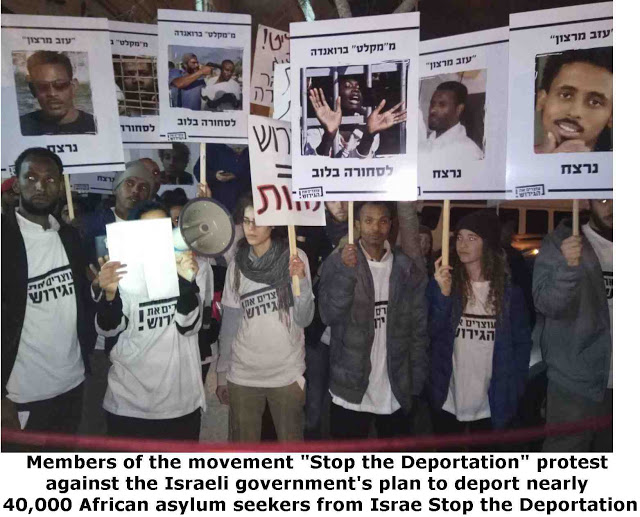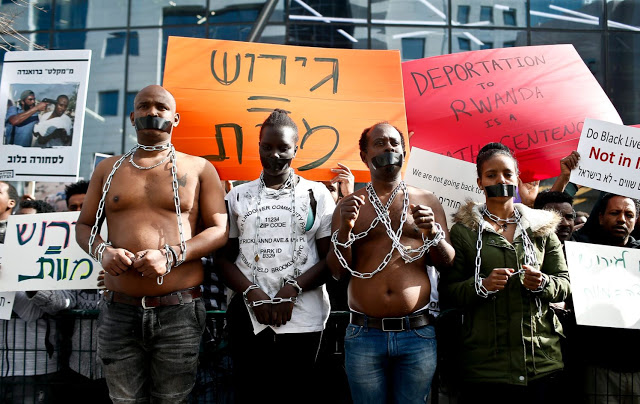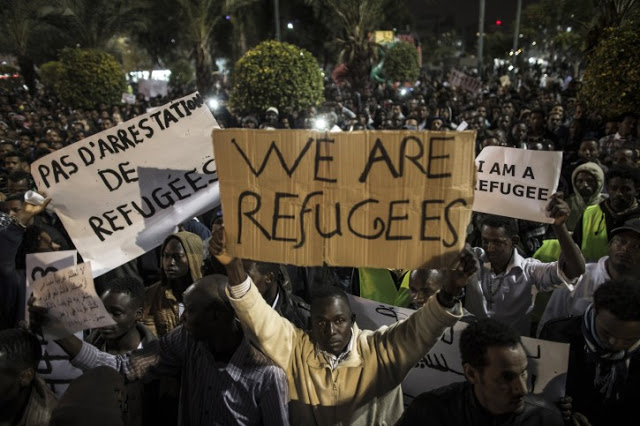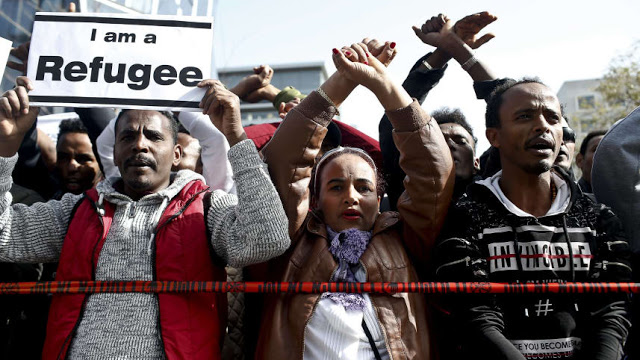The Israeli
Labour Party & the Jewish Labour Movement support Netanyahu’s deportation of Black African refugees
Why Rhea Wolfson should resign
from the JLM and condemn the Israeli Labour Party
from the JLM and condemn the Israeli Labour Party
An amazing thing is happening in Israel. For once the Holocaust is being
put to good use instead of being used as a tool to justify repression. Just 4 days ago David Sheen, a Canadian-Israeli
who has campaigned tirelessly in support of Israel’s 40,000 Black African
refugees, wrote in Electronic Intifada that Israel
was set to win its war on African refugees and Netanyahu would be
able to deport the refugees.
put to good use instead of being used as a tool to justify repression. Just 4 days ago David Sheen, a Canadian-Israeli
who has campaigned tirelessly in support of Israel’s 40,000 Black African
refugees, wrote in Electronic Intifada that Israel
was set to win its war on African refugees and Netanyahu would be
able to deport the refugees.
Yet in the space of a week, as Anshel Pfeffer has written in Ha’aretz (below)
Netanyahu’s plans are in a shambles.
There has been an uprising of Israel’s more liberal middle classes
against what has become an international embarrassment. Even Israel’s Ambassador to the United
States, has warned that it is making Israel even more of an international
pariah.
Netanyahu’s plans are in a shambles.
There has been an uprising of Israel’s more liberal middle classes
against what has become an international embarrassment. Even Israel’s Ambassador to the United
States, has warned that it is making Israel even more of an international
pariah.
What is even more gratifying is that large numbers of Israel’s Holocaust
survivors, in whose name the State has committed many terrible atrocities and
war crimes, have spoken out. The very
same Holocaust survivors who are kept in abject poverty in Israel. If there is one lesson that everyone can
understand from the Holocaust it is that if the West had taken in the Jewish refugees
from Hitler, then far fewer Jews would have died in the Holocaust.
survivors, in whose name the State has committed many terrible atrocities and
war crimes, have spoken out. The very
same Holocaust survivors who are kept in abject poverty in Israel. If there is one lesson that everyone can
understand from the Holocaust it is that if the West had taken in the Jewish refugees
from Hitler, then far fewer Jews would have died in the Holocaust.
Today the same forces that opposed the immigration of Jewish refugees in
the 1930’s – the American Firsters, the Daily Mails and Expresses, the
far-Right anti-immigration politicians – support Zionism and the Israeli state. However the Holocaust survivors themselves realize
that there is a contradiction between racist Zionism and the lessons of the Holocaust. Zionism wishes to preserve a Jewish state
that is as ethnically pure and Jewish as possible. To do this it is prepared to expel thousands
of refugees because they are Black and non-Jewish. As has been pointed out to me, there are
thousands of White non-Jewish Russians in Israel who are not being deported.
the 1930’s – the American Firsters, the Daily Mails and Expresses, the
far-Right anti-immigration politicians – support Zionism and the Israeli state. However the Holocaust survivors themselves realize
that there is a contradiction between racist Zionism and the lessons of the Holocaust. Zionism wishes to preserve a Jewish state
that is as ethnically pure and Jewish as possible. To do this it is prepared to expel thousands
of refugees because they are Black and non-Jewish. As has been pointed out to me, there are
thousands of White non-Jewish Russians in Israel who are not being deported.
What is most shameful is the role of the Israeli Labour Party which
abroad tries to present itself as a progressive party. The ILP has given its full support to Netanyahu’s
deportation campaign. According to Jill
Hoffman of the Jerusalem Post the Zionist Union parliamentary faction
voted 12 to 11 to back the government’s plan to deport refugees after its
leader Avi Gabbay told the MKs that“This
is not an issue of Right or Left, we would pay a price for arguing with the
public.” Party
leader Gabbay forces Zionist Union to back expulsion of migrants
abroad tries to present itself as a progressive party. The ILP has given its full support to Netanyahu’s
deportation campaign. According to Jill
Hoffman of the Jerusalem Post the Zionist Union parliamentary faction
voted 12 to 11 to back the government’s plan to deport refugees after its
leader Avi Gabbay told the MKs that“This
is not an issue of Right or Left, we would pay a price for arguing with the
public.” Party
leader Gabbay forces Zionist Union to back expulsion of migrants
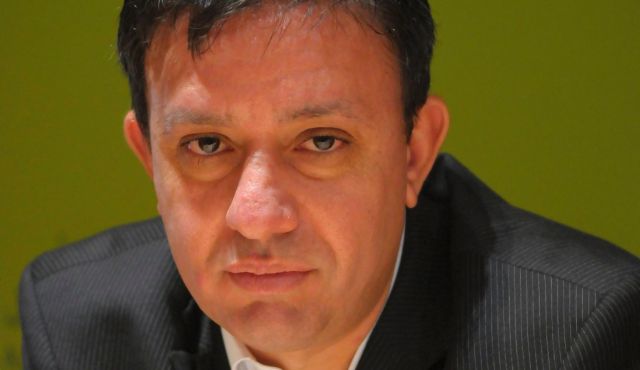 |
| Avi Gabbay – the racist leader of the Israeli Labour Party |
This prompted Tamar Zandberg, a member of the Knesset for the leftist
Meretz Party, to shout that
at the Israeli Labour Party members who backed Benjamin Netanyahu’s plan to
forcibly deport the remaining roughly 40,000 African asylum seekers to a third
country – Rwanda that:
Meretz Party, to shout that
at the Israeli Labour Party members who backed Benjamin Netanyahu’s plan to
forcibly deport the remaining roughly 40,000 African asylum seekers to a third
country – Rwanda that:
”What has become of you? Are you the
Zionist Union or the expelling union? Have you gone mad? In your tactics for
wooing votes, you’ve abandoned your fundamental values and ability to tell
right from wrong.” Israeli
Labor sells out African refugees, as ‘infiltrators’
Zionist Union or the expelling union? Have you gone mad? In your tactics for
wooing votes, you’ve abandoned your fundamental values and ability to tell
right from wrong.” Israeli
Labor sells out African refugees, as ‘infiltrators’
What is more outrageous is that the group
which is behind the false anti-Semitism campaign in the Labour Party, which has been put in charge of anti-racism
training in the Labour Party, the Jewish Labour Movement, refuses to condemn
the stance of the Israeli Labour Party, which it describes as its ‘sister party’ of the ILP.
which is behind the false anti-Semitism campaign in the Labour Party, which has been put in charge of anti-racism
training in the Labour Party, the Jewish Labour Movement, refuses to condemn
the stance of the Israeli Labour Party, which it describes as its ‘sister party’ of the ILP.
One of the members of Labour’s National
Executive Committee, Rhea Wolfson, is a member of the JLM. Wolfson reportedly broke down in tears when fellow
NEC member Darren Williams threatened to vote against referring the case of Jackie Walker to the party’s disciplinary
body, the National Constitutional Committee.
Jackie as people will be aware has been subject to a scurrilous
political lynching by the JLM.
Executive Committee, Rhea Wolfson, is a member of the JLM. Wolfson reportedly broke down in tears when fellow
NEC member Darren Williams threatened to vote against referring the case of Jackie Walker to the party’s disciplinary
body, the National Constitutional Committee.
Jackie as people will be aware has been subject to a scurrilous
political lynching by the JLM.
 |
| Right-wing anti-refugee protestors in Tel Aviv |
We are
calling on Rhea Wolfson to dissociate herself from the racist stance of the JLM
and its Director Jeremy Newmark and to do this in the most public way by
resigning from the organisation.
calling on Rhea Wolfson to dissociate herself from the racist stance of the JLM
and its Director Jeremy Newmark and to do this in the most public way by
resigning from the organisation.
It is unacceptable that someone who is
supposedly on the Left is aligned with the racist policy of the Israeli Labour
Party. Forcible deportation of asylum
seekers is the policy of the racist and fascist Right not the Left of the Labour
Party. Wolfson should be congratulating Israel’s
Holocaust survivors not keeping company with racists.
supposedly on the Left is aligned with the racist policy of the Israeli Labour
Party. Forcible deportation of asylum
seekers is the policy of the racist and fascist Right not the Left of the Labour
Party. Wolfson should be congratulating Israel’s
Holocaust survivors not keeping company with racists.
Tony Greenstein
Only a few weeks ago, activists were conceding defeat to deportation.
But the wheels had been coming off the hastily drawn plan for months
But the wheels had been coming off the hastily drawn plan for months
Jan 26, 2018
African
asylum seekers protesting outside the Rwandan Embassy in Herzliya, Israel,
January 22, 2018.meged gozani
asylum seekers protesting outside the Rwandan Embassy in Herzliya, Israel,
January 22, 2018.meged gozani
One of Prime Minister Benjamin
Netanyahu’s proudest achievements in office has been the new border
fence with Egypt. He may have been exaggerating when he described it in
2013 as “one of the greatest engineering feats ever achieved in Israel.” Still,
it has certainly worked and actually proved one of his least controversial
actions.
Netanyahu’s proudest achievements in office has been the new border
fence with Egypt. He may have been exaggerating when he described it in
2013 as “one of the greatest engineering feats ever achieved in Israel.” Still,
it has certainly worked and actually proved one of his least controversial
actions.
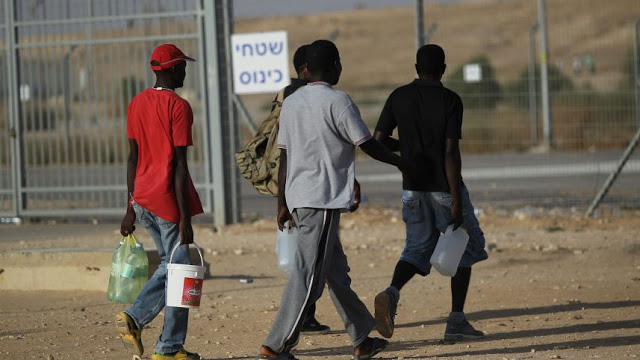 |
| African refugees at the Holot internment camp in the Negev desert |
Replacing the old, ramshackle
barbwire fence, the new 5-meter (16-foot), reinforced steel barrier has made it
much more difficult for Islamist groups to launch cross-border terror attacks
like the one near Eilat in August 2011, when eight Israelis were killed and the
impetus to finally build the fence was provided. It has also severely hampered
the smuggling of arms and drugs, and, most importantly, cut off the Sinai’s
human-trafficking route. Since the fence’s completion in 2013, the Bedouin
gangs that trafficked in Eastern Europe women (to be forced into prostitution)
and African refugees – fleeing repressive Sudan and Eritrea – have had to look
elsewhere.
barbwire fence, the new 5-meter (16-foot), reinforced steel barrier has made it
much more difficult for Islamist groups to launch cross-border terror attacks
like the one near Eilat in August 2011, when eight Israelis were killed and the
impetus to finally build the fence was provided. It has also severely hampered
the smuggling of arms and drugs, and, most importantly, cut off the Sinai’s
human-trafficking route. Since the fence’s completion in 2013, the Bedouin
gangs that trafficked in Eastern Europe women (to be forced into prostitution)
and African refugees – fleeing repressive Sudan and Eritrea – have had to look
elsewhere.
But cutting off the smuggling
channels was not enough. In the seven years before the barrier was up, some 50,000
African refugees had paid the Bedouin’s exorbitant fees and reached Israel.
Denied status and unable to work legally, most of them ended up in cramped
accommodations in south Tel Aviv, where odd jobs were available and a community
of sorts emerged.
channels was not enough. In the seven years before the barrier was up, some 50,000
African refugees had paid the Bedouin’s exorbitant fees and reached Israel.
Denied status and unable to work legally, most of them ended up in cramped
accommodations in south Tel Aviv, where odd jobs were available and a community
of sorts emerged.
A toxic combination of authentic
complaints and unsubstantiated allegations of crime and epidemics made the
plight of south Tel Aviv’s veteran residents a rallying point for far-right
activists – including members of the outlawed Kahanist groups – and Netanyahu
has for years been trying to work out a deportation solution.
complaints and unsubstantiated allegations of crime and epidemics made the
plight of south Tel Aviv’s veteran residents a rallying point for far-right
activists – including members of the outlawed Kahanist groups – and Netanyahu
has for years been trying to work out a deportation solution.
With record low unemployment
rates and a growing demand for foreign workers, a comprehensive plan to
“legalize” the asylum seekers and resettle them across Israel would have been
the humane and efficient solution. But incitement against the “infiltrators” –
as the government calls them – by nationalist politicians and pundits has
turned it into a challenge from the right-wing base that Netanyahu could not
avoid. Deportation was the only way out. Anything less would be seen as a sign
of weakness.
rates and a growing demand for foreign workers, a comprehensive plan to
“legalize” the asylum seekers and resettle them across Israel would have been
the humane and efficient solution. But incitement against the “infiltrators” –
as the government calls them – by nationalist politicians and pundits has
turned it into a challenge from the right-wing base that Netanyahu could not
avoid. Deportation was the only way out. Anything less would be seen as a sign
of weakness.
There was no way the High Court
of Justice would allow the government to deport the Sudanese and Eritreans
back to their homelands. Quiet negotiations were conducted with various African
countries to serve as “third countries,” and eventually secret deals were
reached with Uganda and Rwanda.
of Justice would allow the government to deport the Sudanese and Eritreans
back to their homelands. Quiet negotiations were conducted with various African
countries to serve as “third countries,” and eventually secret deals were
reached with Uganda and Rwanda.
 |
| Prime Minister Benjamin Netanyahu in south Tel Aviv, Moti Milrod |
A few thousand asylum seekers
were prevailed upon to leave “voluntarily,” with a few thousand dollars in
their pockets. But news of how they were mistreated upon arrival soon filtered
back – and then no one was prepared to volunteer any more. However, egged on by
his cheerleaders, Netanyahu refused to back down and together with Interior
Minister Arye Dery, who holds the immigration brief, made dramatic visits last
year to south Tel Aviv, where he was received rapturously.
were prevailed upon to leave “voluntarily,” with a few thousand dollars in
their pockets. But news of how they were mistreated upon arrival soon filtered
back – and then no one was prepared to volunteer any more. However, egged on by
his cheerleaders, Netanyahu refused to back down and together with Interior
Minister Arye Dery, who holds the immigration brief, made dramatic visits last
year to south Tel Aviv, where he was received rapturously.
The main problem was not having
sufficient leverage against the refugees. The High Court refused to let the
government incarcerate them for more than 60 days. But a breakthrough came for
Netanyahu last December, when the High Court approved deportation to “third
countries” of any refugee whose asylum request is not pending. The fact the
Interior Ministry has made it extremely difficult to request asylum – and that
of 12,000 requests, only a third have been cursorily processed, and of those
only 10 approved – failed to sway the justices.
sufficient leverage against the refugees. The High Court refused to let the
government incarcerate them for more than 60 days. But a breakthrough came for
Netanyahu last December, when the High Court approved deportation to “third
countries” of any refugee whose asylum request is not pending. The fact the
Interior Ministry has made it extremely difficult to request asylum – and that
of 12,000 requests, only a third have been cursorily processed, and of those
only 10 approved – failed to sway the justices.
The orders were given to expedite
the mass deportation plan. Dozens of planes were to be chartered, the refugees
given the stark choice of leaving voluntarily with $3,500 in cash or facing
indefinite detention. The Rwandan government was to receive $5,000, or some
other form of goods or arms, for every refugee they accepted.
the mass deportation plan. Dozens of planes were to be chartered, the refugees
given the stark choice of leaving voluntarily with $3,500 in cash or facing
indefinite detention. The Rwandan government was to receive $5,000, or some
other form of goods or arms, for every refugee they accepted.
Only a few weeks ago it seemed
all over. The small band of activists who had fought for the refugees’ rights
were conceding defeat and trying to at least save the unaccompanied children
among them from deportation.
all over. The small band of activists who had fought for the refugees’ rights
were conceding defeat and trying to at least save the unaccompanied children
among them from deportation.
But even as the first notices
were being issued to the refugees, the wheels were coming off from the plan. It
had been drawn up too hastily, without due consultation with the various
agencies involved. The Israel Prison Service, already suffering from massive overcrowding,
made clear it had no space for the thousands of expected detainees. The refugee
groups made clear they would not accept the financial inducements and when the
government threatened to deport them by force, legal advisers made clear to the
High Court they would almost certainly accept a petition against forcible
deportation.
were being issued to the refugees, the wheels were coming off from the plan. It
had been drawn up too hastily, without due consultation with the various
agencies involved. The Israel Prison Service, already suffering from massive overcrowding,
made clear it had no space for the thousands of expected detainees. The refugee
groups made clear they would not accept the financial inducements and when the
government threatened to deport them by force, legal advisers made clear to the
High Court they would almost certainly accept a petition against forcible
deportation.
No less important, the small
circle of activists supporting the refugees had rapidly begun to grow. A series
of petitions circulated, with the signatories committing themselves to hiding
refugees in their homes if necessary.
circle of activists supporting the refugees had rapidly begun to grow. A series
of petitions circulated, with the signatories committing themselves to hiding
refugees in their homes if necessary.
At first, it was easy for the
government’s supporters in the media to deride these groups as anti-Zionist,
far-leftist, elitist NIMBYists who didn’t care for the poor residents of south
Tel Aviv. But still
the protests grew, with petitions signed by over 1,000 doctors and medical
staff; 100 air crew refused to man deportation flights and called upon their
colleagues not to do so either; and, perhaps most damagingly, a personal letter
was sent to Netanyahu, signed
by 36 Holocaust survivors.
government’s supporters in the media to deride these groups as anti-Zionist,
far-leftist, elitist NIMBYists who didn’t care for the poor residents of south
Tel Aviv. But still
the protests grew, with petitions signed by over 1,000 doctors and medical
staff; 100 air crew refused to man deportation flights and called upon their
colleagues not to do so either; and, perhaps most damagingly, a personal letter
was sent to Netanyahu, signed
by 36 Holocaust survivors.
The publicity has already caused
Rwanda to announce it has no “secret” agreement with Israel and that it
will not accept refugees deported against their will. Whatever deal
President Paul Kagame’s government has with Netanyahu, it doesn’t seem to be
worth the adverse publicity in Africa.
Rwanda to announce it has no “secret” agreement with Israel and that it
will not accept refugees deported against their will. Whatever deal
President Paul Kagame’s government has with Netanyahu, it doesn’t seem to be
worth the adverse publicity in Africa.
The timing couldn’t have been
worse. The survivors’ letter is now the main Holocaust-related
news coming out of Israel just in time for the one date in the calendar when
most of the global media is looking for stories on this issue: International
Holocaust Remembrance Day, this Saturday.
worse. The survivors’ letter is now the main Holocaust-related
news coming out of Israel just in time for the one date in the calendar when
most of the global media is looking for stories on this issue: International
Holocaust Remembrance Day, this Saturday.
It hardly seemed necessary, but
apparently even Israel’s ambassador to the United States and one of Netanyahu’s
closest advisers, Ron Dermer – certainly no liberal – has been warning the
prime minister of the PR disaster being caused by reports about the
deportations.
apparently even Israel’s ambassador to the United States and one of Netanyahu’s
closest advisers, Ron Dermer – certainly no liberal – has been warning the
prime minister of the PR disaster being caused by reports about the
deportations.
Is the leaking of Dermer’s
concerns the harbinger of a government climbdown? It’s too early to say. Either
way, Netanyahu will seek to blame the south Tel Aviv-hating left for sabotaging
his “humane and just” deportation and furthering their goal of swamping Israel
with aliens.
concerns the harbinger of a government climbdown? It’s too early to say. Either
way, Netanyahu will seek to blame the south Tel Aviv-hating left for sabotaging
his “humane and just” deportation and furthering their goal of swamping Israel
with aliens.
There are valuable lessons here
for embattled Israeli human rights groups on how to actually win a campaign
despite what seem at first like insurmountable odds and public indifference.
for embattled Israeli human rights groups on how to actually win a campaign
despite what seem at first like insurmountable odds and public indifference.
It is still way too early to
declare victory. But even if Netanyahu succeeds in salvaging his plan, the
self-inflicted damage has been done and the deportations, if they take place,
will be accompanied by a great deal more lousy publicity for him. What seemed
imminent a few weeks ago now looks improbable.
declare victory. But even if Netanyahu succeeds in salvaging his plan, the
self-inflicted damage has been done and the deportations, if they take place,
will be accompanied by a great deal more lousy publicity for him. What seemed
imminent a few weeks ago now looks improbable.
Dina Kraft
Jan 26, 2018 3:10 PM
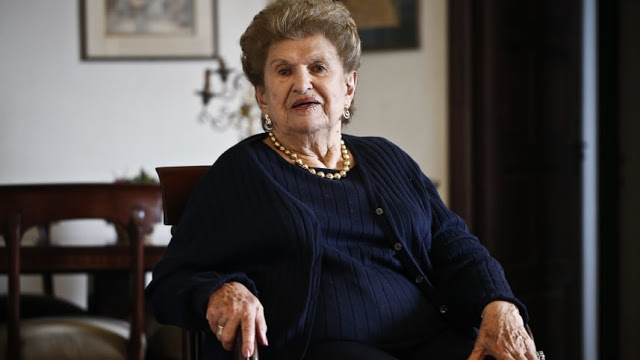 |
| Celina Shapil, 92-year-old Holocaust survivorMaged Gozani |
Celina Shapil spent the winter of 1943 on the
run from the Nazis, crossing the borders of Poland, Slovakia and Hungary on
foot through the snow at age 17.
Now, this 92-year-old Holocaust survivor sees
her own story reflected in the plight of African asylum seekers in Israel, and
when she heard of the government’s
plan to deport them, she was outraged. And then she decided it was time to
speak out.
her own story reflected in the plight of African asylum seekers in Israel, and
when she heard of the government’s
plan to deport them, she was outraged. And then she decided it was time to
speak out.
“I too have lived through a situation
where the whole world was apathetic. I know what it feels like to be alone and
feel like no one cares,” she told Haaretz. “It’s shameful we are the ones now
doing this. It should not have to come to this so there needs to be public
pressure the government must change its policy.”
where the whole world was apathetic. I know what it feels like to be alone and
feel like no one cares,” she told Haaretz. “It’s shameful we are the ones now
doing this. It should not have to come to this so there needs to be public
pressure the government must change its policy.”
A group of Holocaust survivors sent
a letter to Prime Minister Benjamin Netanyahu on Thursday imploring him not
to go ahead with his plan to deport African asylum seekers from Israel.
a letter to Prime Minister Benjamin Netanyahu on Thursday imploring him not
to go ahead with his plan to deport African asylum seekers from Israel.
They join a grassroots effort that already
includes airline
pilots, writers, college professors, doctors, lawyers, university students,
social workers, filmmakers and rabbis, attempting to prevent the planned deportation
by the Israeli government of nearly 40,000 African asylum seekers over the next
two years to either their home countries or other countries in Africa.
includes airline
pilots, writers, college professors, doctors, lawyers, university students,
social workers, filmmakers and rabbis, attempting to prevent the planned deportation
by the Israeli government of nearly 40,000 African asylum seekers over the next
two years to either their home countries or other countries in Africa.
“We – who know what it means to be a refugee, to be without a home or a country
that would protect and defend us from violence and suffering – cannot
understand how a Jewish government can expel refugees and asylum seekers to a
journey of pain, suffering and death,” the 36 survivors wrote to Netanyahu.
that would protect and defend us from violence and suffering – cannot
understand how a Jewish government can expel refugees and asylum seekers to a
journey of pain, suffering and death,” the 36 survivors wrote to Netanyahu.
Reports from asylum seekers, predominately from
Sudan and Eritrea who have already made the return journey to Africa from
Israel, are harrowing. There are accounts collected by researchers of asylum
seekers who left Israel being robbed, sold into human trafficking and even
killed.
Sudan and Eritrea who have already made the return journey to Africa from
Israel, are harrowing. There are accounts collected by researchers of asylum
seekers who left Israel being robbed, sold into human trafficking and even
killed.
Diaspora Jews have also been among those
pushing Israel to reconsider its policy, citing Jewish values and invoking the
Biblical injunction to “not mistreat or oppress a foreigner, for you were
foreigners in Egypt” (Exodus 22:21) as well as the Jewish people’s long
history with flight from persecution and genocide.
pushing Israel to reconsider its policy, citing Jewish values and invoking the
Biblical injunction to “not mistreat or oppress a foreigner, for you were
foreigners in Egypt” (Exodus 22:21) as well as the Jewish people’s long
history with flight from persecution and genocide.
Thousands have signed petitions and hundreds
of people turned out for meetings on a rain-soaked Wednesday night in Jerusalem
and Tel Aviv organized by a group called Standing Together (Omdim Beyachad) to
fight the deportations. Thousands of Israelis called on airline workers not to
take part in flights that would take the asylum seekers to Africa in a campaign
organized by the group Zazim and a new national organization founded by
university students has sprung up called “Stop the Deportation” and is holding
protests and setting up information booths across the country.
of people turned out for meetings on a rain-soaked Wednesday night in Jerusalem
and Tel Aviv organized by a group called Standing Together (Omdim Beyachad) to
fight the deportations. Thousands of Israelis called on airline workers not to
take part in flights that would take the asylum seekers to Africa in a campaign
organized by the group Zazim and a new national organization founded by
university students has sprung up called “Stop the Deportation” and is holding
protests and setting up information booths across the country.
The backlash and civil society organization is being joined by many people who
were not involved in the past, veteran activists say.
were not involved in the past, veteran activists say.
The first asylum seekers came to Israel a
little over a decade ago. Originally most were from the Darfur region of Sudan,
seeking refuge from the savage civil war raging there, but then tens of
thousands more joined from elsewhere in Sudan and Eritrea, posing a moral
puzzle over how to handle the influx to Israel, a country founded in the shadow
of the Holocaust whose Jewish population is largely descended from refugees
from Nazi Europe or Middle Eastern countries.
little over a decade ago. Originally most were from the Darfur region of Sudan,
seeking refuge from the savage civil war raging there, but then tens of
thousands more joined from elsewhere in Sudan and Eritrea, posing a moral
puzzle over how to handle the influx to Israel, a country founded in the shadow
of the Holocaust whose Jewish population is largely descended from refugees
from Nazi Europe or Middle Eastern countries.
In the last week, some Holocaust survivors
have even offered to hide asylum seekers in their own homes and hundreds of
other Israelis have offered to do the same.
have even offered to hide asylum seekers in their own homes and hundreds of
other Israelis have offered to do the same.
“Deportation is like a red line for many
people. Until now we could just sit at home and say ‘Oh no, this is bad.’
And for the past few years people who care and follow the issue have been
outraged, but this is the last straw,” said Ella Navot, a 24-year-old sociology
student at Tel Aviv University and one of the founders of “Stop the Expulsion.”
people. Until now we could just sit at home and say ‘Oh no, this is bad.’
And for the past few years people who care and follow the issue have been
outraged, but this is the last straw,” said Ella Navot, a 24-year-old sociology
student at Tel Aviv University and one of the founders of “Stop the Expulsion.”
Navot started volunteering with asylum
seekers four years ago, teaching basic computer skills at a learning center.
seekers four years ago, teaching basic computer skills at a learning center.
“There are so many aspects to what drew me to
this. I could talk about the fact that my grandmother is a Holocaust survivor
or about my parents who are left-wing and have always advocated for human
rights, but really what brought me to it is when I met the people themselves
and started to understand the issue. They became friends and when one hears
their stories one cannot ignore them,” she said.
this. I could talk about the fact that my grandmother is a Holocaust survivor
or about my parents who are left-wing and have always advocated for human
rights, but really what brought me to it is when I met the people themselves
and started to understand the issue. They became friends and when one hears
their stories one cannot ignore them,” she said.
A
campaign was launched last week, calling on Israelis to hide asylum seekers
if it becomes necessary, was inspired, its organizers say, by the story of Anne
Frank. The massive response to the campaign, now called Miklat Yisrael (Israel
Refuge) took its organizers, including American-born Rabbi Susan Silverman of
Jerusalem who came up with the idea, by surprise.
campaign was launched last week, calling on Israelis to hide asylum seekers
if it becomes necessary, was inspired, its organizers say, by the story of Anne
Frank. The massive response to the campaign, now called Miklat Yisrael (Israel
Refuge) took its organizers, including American-born Rabbi Susan Silverman of
Jerusalem who came up with the idea, by surprise.
“We are getting an amazing response,” said
Silverman, with hundreds of requests from both individuals and groups,
including kibbutzim. And this is before, she notes, they begin doing official
outreach. Among the communities volunteering are some located in the West Bank.
Silverman, with hundreds of requests from both individuals and groups,
including kibbutzim. And this is before, she notes, they begin doing official
outreach. Among the communities volunteering are some located in the West Bank.
Two Israeli law students help an
African Asylum Seeker with her request for asylum at a Legal Clinic run by HIAS
Israel which assists migrants and refugeesRachel
Friedman
African Asylum Seeker with her request for asylum at a Legal Clinic run by HIAS
Israel which assists migrants and refugeesRachel
Friedman
“And here we are, a bunch of lefties going,
‘What?’ But it turns out we can find common ground. Stopping people from being
sent to their deaths is one of those ways,” she said.
‘What?’ But it turns out we can find common ground. Stopping people from being
sent to their deaths is one of those ways,” she said.
A
campaign was launched last week, calling on Israelis to hide asylum seekers
if it becomes necessary, was inspired, its organizers say, by the story of Anne
Frank. The massive response to the campaign, now called Miklat Yisrael (Israel
Refuge) took its organizers, including American-born Rabbi Susan Silverman of
Jerusalem who came up with the idea, by surprise.
campaign was launched last week, calling on Israelis to hide asylum seekers
if it becomes necessary, was inspired, its organizers say, by the story of Anne
Frank. The massive response to the campaign, now called Miklat Yisrael (Israel
Refuge) took its organizers, including American-born Rabbi Susan Silverman of
Jerusalem who came up with the idea, by surprise.
“We are getting an amazing response,” said
Silverman, with hundreds of requests from both individuals and groups,
including kibbutzim. And this is before, she notes, they begin doing official
outreach. Among the communities volunteering are some located in the West Bank.
Silverman, with hundreds of requests from both individuals and groups,
including kibbutzim. And this is before, she notes, they begin doing official
outreach. Among the communities volunteering are some located in the West Bank.
 |
| Two Israeli law students help an African Asylum Seeker with her request for asylum at a Legal Clinic run by HIAS Israel which assists migrants and refugeesRachel Friedman |
“And here we are, a bunch of lefties going,
‘What?’ But it turns out we can find common ground. Stopping people from being
sent to their deaths is one of those ways,” she said.
‘What?’ But it turns out we can find common ground. Stopping people from being
sent to their deaths is one of those ways,” she said.
Silverman, whose sister is the American comedian Sarah Silverman, said she is
heartened that so many are coming forward to say no to deportation, including,
for example, a letter by flight attendants, who announced they would not work
on flights that were deporting the asylum seekers.
heartened that so many are coming forward to say no to deportation, including,
for example, a letter by flight attendants, who announced they would not work
on flights that were deporting the asylum seekers.
“Every link in the deportation chain is
beginning to be blocked,” she said.
beginning to be blocked,” she said.
Sivan Carmel, Director of HIAS Israel,
which for years has been among the main non-profits working to help the asylum
seekers, is heartened by the rush of new activism and resistance among Israelis
and Diaspora Jews.
which for years has been among the main non-profits working to help the asylum
seekers, is heartened by the rush of new activism and resistance among Israelis
and Diaspora Jews.
“I welcome it. I think it’s amazing that
every day we hear new people speak out,” she said. “As Israelis this is about
being connected to our heritage – knowing what our values are about and what
kind of society we want to raise our kids in.”
every day we hear new people speak out,” she said. “As Israelis this is about
being connected to our heritage – knowing what our values are about and what
kind of society we want to raise our kids in.”
Carmel said that despite the government
attempts to paint the asylum seekers as economic migrants and not refugees,
calling them dangerous and labeling them as “infiltrators”, Israeli citizens
are heeding the call to action. Out of approximately 35,000 Sudanese and
Eritrean migrants in Israel, only eleven to date have been granted official
asylum here.
attempts to paint the asylum seekers as economic migrants and not refugees,
calling them dangerous and labeling them as “infiltrators”, Israeli citizens
are heeding the call to action. Out of approximately 35,000 Sudanese and
Eritrean migrants in Israel, only eleven to date have been granted official
asylum here.
Chained asylum seekers during a
protest in front of the Rwandan embassy in Herzliya against Israel’s plans to
deport African refugeesMaged Gozani
protest in front of the Rwandan embassy in Herzliya against Israel’s plans to
deport African refugeesMaged Gozani
“People are beginning to understand the facts
that many of them are asylum seekers who fled from persecution, but less than
half percent have received refugee status even though most of their
counterparts from Sudan and Eritrea have been determined to be refugees in
other countries,” said Carmel.
that many of them are asylum seekers who fled from persecution, but less than
half percent have received refugee status even though most of their
counterparts from Sudan and Eritrea have been determined to be refugees in
other countries,” said Carmel.
Michael Sfard, a well-known human rights
lawyer was among lawyers across the country who signed a public letter against
the deportations.
lawyer was among lawyers across the country who signed a public letter against
the deportations.
“I think we lawyers have to cry out and voice
our position that this is a reprehensible act even if it is done or portrayed
as being done by legal means and going through legal channels because in the
most profound way it is illegal,” said Sfard.
our position that this is a reprehensible act even if it is done or portrayed
as being done by legal means and going through legal channels because in the
most profound way it is illegal,” said Sfard.
Shapil, who made it to present-day Israel’s
shores in 1944 after fleeing into a Russian-held part of Romania, continues to
mourn her parents and younger brother who were murdered in Auschwitz, but feels
lucky to have been able to rebuild her life here. She hopes the African asylum
seekers will find refuge here too.
shores in 1944 after fleeing into a Russian-held part of Romania, continues to
mourn her parents and younger brother who were murdered in Auschwitz, but feels
lucky to have been able to rebuild her life here. She hopes the African asylum
seekers will find refuge here too.
Otherwise, she warns, “We will go down
terribly in history.”
terribly in history.”
Posted in Blog
